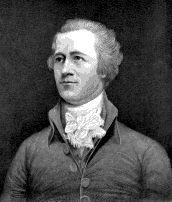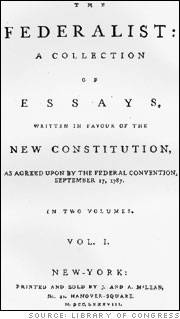Alexander Hamilton

Great American statesman
 In the years after the Revolutionary war, Hamilton practiced law. He often defended pro-British Loyalists. Not only did he feel it was time to put the bitter feelings of war to rest, but he realized that Loyalists could serve the interests of the new nation. Many of them had been successful merchants before the war, and their skills could help the nation become an economic powerhouse.  Hamilton, along with James Madison and John Jay, wrote the Federalist Papers, a series of eighty-five political essays first published by New York City newspapers in 1787–1788, and later published as a book, The Federalist. The essays, which advocated the ratification of the U.S. Constitution, are considered among the most probing and insightful explorations and analyses of the Constitution and the principles upon which the U.S. government is based. |
Early Career
Alexander Hamilton, 1755-1804, American statesman, b. Nevis, in the West Indies was the illegitimate son of James Hamilton (of a prominent Scottish family) and Rachel Faucett Lavien (daughter of a doctor-planter on Nevis and the estranged wife of a merchant). Orphaned and impoverished at around the age of 12, the brilliant, ambitious youth went to the North American colonies late in 1772 and studied (1773-74) at King's College (now Columbia). In the troubled times leading to the American Revolution, he wrote articles and pamphlets espousing the colonial cause so well that the works were popularly attributed to John Jay.
In the war he became a captain of artillery, attracted George Washington's notice, and, as Washington's secretary and aide-de-camp, performed invaluable services. Desiring more active duty, he left Washington's staff in 1781 and performed brilliantly in the field at Yorktown. His marriage to Elizabeth Schuyler, daughter of Gen. Philip J. Schuyler, connected him with an old and powerful New York family. He practiced law in New York City and was a member of the Continental Congress.
Federalist Leader
By 1780 Hamilton had outlined a plan of government with a strong central authority to replace the weak system of the Articles of Confederation, and as delegate (1782-83) to the Continental Congress he pressed continually for strengthening of the national government. It was Hamilton who proposed at the unsuccessful Annapolis Convention (1786) that a constitutional convention be called at Philadelphia in May, 1787, and he was one of New York's three delegates when it was convened.
Although he believed the Constitution to be deficient in the powers that it gave the national government, he did much to get it ratified, particularly by means of his contributions to The Federalist. In New York, Hamilton was a powerful constitutional supporter, fighting vigorously against the opposition of George Clinton and becoming perhaps the strongest advocate of the new instrument of government aside from James Madison.
In the first decade of the republic, Hamilton played a decisive role in shaping domestic and foreign policy. As Secretary of the Treasury under George Washington, he presented (1790) a far-reaching financial program to the first Congress. He proposed that the debt accumulated by the Continental Congress be paid in full, that the federal government assume all state debts, and that a Bank of the United States be chartered. For revenue, Hamilton advocated a tariff on imported manufactures and a series of excise taxes. He hoped by these measures to strengthen the national government at the expense of the states and to tie government to men of wealth and prosperity.
Hamilton was a well-to-do lawyer and banker (he helped to found the Bank of New York), and his own high connections aroused suspicion among the less conservative; his policies alienated agrarian interests and drew opposition from those who feared concentration of power in the federal government. Widespread antipathy to party divisions muted the opposition, however, and Congress adopted the Hamiltonian program.
Foreign affairs soon brought this unity to an end. Hamilton's program depended for success on continued trade with Great Britain. He supported Jay's Treaty (1794), and, opposed to the French Revolution, encouraged strong measures against France in the near-war of 1798-measures bitterly opposed by the pro-French Thomas Jefferson.
Two opposing parties formed: the Federalists, led by Hamilton and John Adams (then President), and the Democratic Republicans (see Democratic party), led by Jefferson and James Madison. Hamilton was perhaps the most powerful of the Federalists, but he was not in complete command of the party (he had even resigned his cabinet post in 1795, largely for financial reasons). There was little personal liking between Hamilton and Adams, and friction between them grew in the course of the Adams administration. Both were swept under in the election of 1800.
Because the Constitution did not provide for the election of the President and Vice President on separate ballots, a tie between Jefferson and his running mate, Aaron Burr, left the choice of chief executive to the House of Representatives in 1800. Hamilton's influence made Jefferson President and Burr Vice President-an outcome in accord with the popular will, but Burr was disgruntled.
When in 1804 Hamilton again thwarted Burr, keeping him from the governorship of New York, Burr accused Hamilton of having called him a “dangerous“ man and, when Hamilton replied to the charge, challenged him to a duel. The two men met at Weehawken Heights, N.J., and Hamilton was mortally wounded.
The Columbia Electronic Encyclopedia, 6th ed. Copyright © 2005, Columbia University Press. All rights reserved.
- More from U.S. History Biographies







